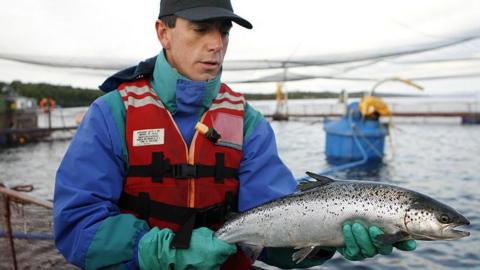Chile is the world's second-largest exporter of farmed salmon, and the biggest supplier to the US. In the south of the country a dispute continues over the large number of salmon farms that are located in supposedly protected areas.
The port city of Puerto Montt, more than 1,000km (600 miles) south of Chile's capital Santiago, is at the heart of the country's farmed Atlantic salmon industry.
At a processing facility on the outskirts of town workers kitted out in white suits, hairnets, facemasks, and blue plastic gloves and boots prepare fresh and smoked salmon for export to the US and Japan.
In a spacious meeting room, Fracisco Lobos, the chief corporate officer for the plant's owner – salmon-exporter Multi X – explains how farming the fish has transformed the south of Chile.
"Salmon's been part of this region's industrial revolution," he says. "There used to be a lot of poverty in the region, and now many people earn more than in other parts of Chile.
"Because of the industry a lot of support services have sprung up, which benefit the families living here, and people have moved here from other parts of the country for work."
